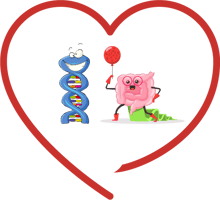DNA Battle of the Sexes Weaponized Genetic Testing and Depression in a Married Couple
- Home
- Blog

“Once you bring genes into the picture, then our perception of ourselves can no longer be the same.”
– Paul Berg, Nobel Laureate
(For example) “We got to have a re-vote. This ain’t right”- Snoop Dogg, on discovering that he has more European ancestry than Charles Barkley
Reader, this week I want to begin with a little thought experiment. Imagine, for a moment, you’re a young, married professional, looking forward to a full life ahead of you. Now, imagine you find out your partner is genetically predisposed to heart disease or Alzheimer’s. How would you react? If you’re anything like me, I bet you’d jump into action right away. “What can we do to fight these dreaded diseases off, Doc?” you might say. “I want my partner to be as healthy for as long as possible!” Now, imagine you find out your partner is genetically predisposed to mood swings, depression, or anxiety. How would you react then? I’m willing to bet your reaction would be much, much different—and possibly even more skeptical. If that’s the case, you’re certainly not alone.
Rene Descartes, the father of modern philosophy, is mostly remembered for the words, “I think, therefore I am.” But his works also put forth a concept known as “mind-body dualism”—a concept that has become the backbone of how many individuals in our society think of themselves. The idea is actually quite simple: the nature of the mind as a “thinking, non-extended thing” is so different from the body, “an extended, non-thinking thing”, that they must be two, distinct, and entirely separate entities. And while you may be made up of both mind and body, under Dualism the “You” you—that is, the thinker, the feeler, the ”Self” —well, that person is one and the same with the mind. Turning this back, then, to that thought experiment, it suddenly becomes easy to understand why we view diseases of the body as separate from our “Selves,” yet view diseases of the mind to be much more personal. Some of us even think of those mental diseases as “personality flaws” —a failure of will—or a lack of character or motivation —things we should be able to “fix”.
But reader: this mind-body distinction is not proven out by basic biology. Our genetic code dictates the probability of us developing most chronic illnesses, both physical and mental. And today, I want to share with you a profoundly human, 21st century story that illustrates why we should be careful NOT to conceptualize mental illness as synonymous with “personality flaws”—and how toxic it can be to a love relationship when the biologic basis of mental illness is “weaponized.”
“Your Feelings are Getting in the Way!” One Couple – She was from Venus, He was from Mars
Mulan and Daana* came in to see me because of intensifying marital conflicts. Mulan was from China, and Daana was from Afghanistan—a not-that-uncommon multicultural marriage in our Washington, DC, area, one of our nation’s Melting Pot Cities. She was a consultant at The World Bank, and he was a network security analyst. This thirty-something couple openly shouted at each other in the first session, and I had to calm them down on numerous occasions. They argued about whether or not they should have children, about Daana’s views that Mulan didn’t respect his family or like his friends, and about Mulan’s views that Daana blamed her for having too many feelings and emotions.
But, as often happens, many of their arguments stemmed from a deeper, unspoken disagreement: they had very different views on mental illness. Mulan knew she had mental health concerns and she took them very seriously, consulting with other psychiatrists to help with mood swings, depression, and trouble with executive function. In fact, she had been on a number of medications which were not helping her, and in fact may have been making her worse. Daana, on the other hand, suffered from symptoms of ADHD and anxiety but had refused psychiatric consultation altogether.
To put this another way: Mulan believed her emotions were not just a “personality flaw”—instead, she suspected there may be something biological going on that she could not just “fix” out of sheer force of will, even with the fierce determination she possessed that had pulled her out of a life of poverty in her country of origin. Daana, on the other hand, saw his own mental health issues as well as Mulan’s as 100% determined by free will. I saw evidence of this in action at one point in the first session when Daana said to her, “There you go again, Mulan, all you care about is your feelings… you just feel so entitled to them, and they are all so wrong! None of them are real!” Mulan doubted the mind-body distinction. Daana believed it entirely.
It’s Not You, It’s Your Genes: How Genetic Testing of Your COMT, BDNF, ANK3, CYP219, CD33, LRP1, FUT2, FKBP5, and Other Genes can Free You from the Mind-Body Distinction
Given Mulan’s openness to the idea that her biology may be predisposing her to mood swings and other cognitive impairments, I was not surprised when she brought up genetic testing. I administer Genomind’s Genecept and Mindful DNA Assays to all of my patients suffering from anxiety, depression, or bipolar disorder, because these tests allow me to develop a more precise approach to treatment—and I was thrilled to have a patient who was already familiar with these tests and was all-in. While Daana refused any workup for his cognitive and emotional symptoms, Mulan’s results proved to be quite interesting, including variations in COMT (Val/Val), BDNF, ANK3, and CYP2C19 on Genecept; and CD33, LRP1 (history of migraine headaches), FUT2 (history of GI distress and mild IBS), FKBP5, MIR-181, OXTR, and MEIS1 on Mindful. Individually and collectively, a number of these genes confer higher rates of mood instability, reduced resilience to stress, and proneness to cognitive impairment. Each gene regulates one or more biological pathways, and a comprehensive treatment strategy should include epigenetic modifiers of each individual pathway, to optimize the probability of a return to good health.
And so we addressed each of Mulan’s personal genomic variations with the following treatment regimen, implemented in a stepwise fashion over a period of eight weeks:
Mulan’s Val/Val variant on her COMT gene meant her body produced more of the COMT enzyme responsible for breaking down dopamine, norepinephrine, and certain types of estrogens. This variant left her predisposed to a lower level of executive functioning and ability to sustain focus and concentration. In order to address this deficit, we wanted to increase her levels of one neurotransmitter in particular: dopamine. We increased those dopamine levels by adding green tea into her diet, which contains Catechin polyphenols, such as quercetin and epigallocatechin gallate (EGCG), which act as natural COMT inhibitors.
To address Mulan’s “risk” BDNF gene, which left her with less “brain fertilizer” than those with a different genetic makeup and therefore less mood regulation and executive functioning capabilities, we added lithium, Omega 3s (EPA and DHA), and aerobic fitness exercises to her daily regimen. Each of these have been shown to increase levels of BDNF and lead to more creativity, mood stability, and other key emotional and cognitive functions.
If you’ve been following our blog, you know that ANK3 is one of our body’s “mood swing” genes. It’s responsible for the maintenance of your brain cells’ sodium ion channels, which in turn help you regulate emotional experiences. If you have a “risk” ANK3 gene variant like Mulan, it can take your body a long time to return to normal after “high emotion” experiences—leaving you prone to emotional roller coaster rides. The epigenetic modifiers I recommended to Mulan? Lamotrigine, lithium and Omega 3s: prescriptions and supplements that would help her to modulate these genes, and thus have greater control over her more extreme emotional responses.
Once we were able to address Mulan’s mood-regulating genetic variants, we could begin to fine-tune her overall health and wellbeing by looking at other body-systems that could be negatively affecting how she felt and functioned (remember—the mind-body connection is vitally important to keep in mind on the path to becoming whole!) Mulan’s Mindful DNA genetic test showed she had a variant of her CD33 gene that predisposed her to oxidative stress and damaged neurons. In order to help her protect her brain, we added Melatonin to her supplements regimen and placed her on the Mediterranean Diet. Because her LRP1 variant is associated with migraine headaches (and a higher risk of Alzheimer’s Disease)—Mulan added Magnesium and Coenzyme Q10 to address her migraines; and the lithium, omega 3 and Mediterranean Diet would help protect her against developing dementia. You may wonder, why worry about dementia in a 33-year-old woman? We now know that biochemical changes in the brain begin many years before Alzheimer’s Disease is diagnosed, so why not begin to prevent it now? Mulan suffered from some gastrointestinal issues that could be rooted in a variant of her FUT2 gene, responsible for the attachment and growth of intestinal microbiota. Her variant meant she had a higher probability of lower diversity in her gut bacteria, or microbiome, which can indeed lead to inflammation, immune system dysfunction, and other dysregulation of the GI tract. We addressed this by adding probiotics and prebiotics to her diet. Lastly, we added Vitamin D to address a variant on her FKBP5 gene, which left her body prone to a dysregulated cortisol response to stress and a higher risk of PTSD.
Weaponizing DNA: When Partners Make your Mental Illness Your—and Your Genes’—Fault
The good news was that by the end of one month, Mulan was beginning to feel better. Two months into treatment, she reported that she felt the best she had in years, including a complete disappearance of her suicidal thoughts. This was huge!
The bad news was that Daana began to “weaponize” Mulan’s genetic testing results in our couple’s sessions. Beliefs are so extremely personal, and Daana had to face the fact that his wife was a changed person all thanks to a genetic test. After years of blaming Mulan as a person for her flaws, he was having trouble admitting that it wasn’t her—it really was her genes. Unsure of what to do, he began using Mulan’s DNA against her, using her results as a weapon to prove her mind really was flawed and broken. He would comment, “I always knew that you were the sick one in our relationship.” And, “No wonder you have mood swings with all those genetic abnormalities.” And, “See, I told you that your feelings had no basis in reality, and these genetic tests just prove it.”
These very hurtful (and completely untrue) statements by Daana infuriated Mulan, but as her resilience began to increase resulting from the medications and supplements I prescribed for her, the “New Mulan” began to stand up for herself. With my support and encouragement, she began to confront Daana with comments like, “Daana, that really hurts my feelings and makes me feel completely unloved. Do you think you have a perfect genotype? What if you had genes that predisposed you to cancer, and then developed a malignant tumor, would you expect me to attack you because of your genetic predisposition? How would it make you feel? And you seem ashamed or afraid to address your ADHD and anxiety symptoms by getting your own genes tested. What is that all about?”
Daana began to feel ashamed of his attacks on her, and we worked to help him feel more compassionate. What helped was that his family did have a history of cancer, and this chastened him, and helped him empathize with Mulan’s own genetic vulnerabilities. He also came to learn through my assistance that while Mulan’s genes may have exaggerated the strength of her feelings, nonetheless many of the feelings themselves were based in how he treated her. Paradoxically, his very repudiation and rejection of her feelings merely served to make her feel disrespected, which in turn amplified them even more!
Slowly but surely, he understood that the mind and the body are inextricably interconnected. While Mulan and Daana may have continued with some marital arguments, they’d worked out a central issue: Mulan was more than her mental illness—and with genetic testing, she was able to become everything she always knew she could be. Daana still resists genetic testing for himself. Maybe because he is empathizing with Snoop Dogg!

Related Information
- Learn about Genetic Testing
- Learn about Potomac Psychiatry
- Meet Our Doctors
- Contact Potomac Psychiatry
.png?width=144&height=144&name=Untitled%20design%20(34).png)



